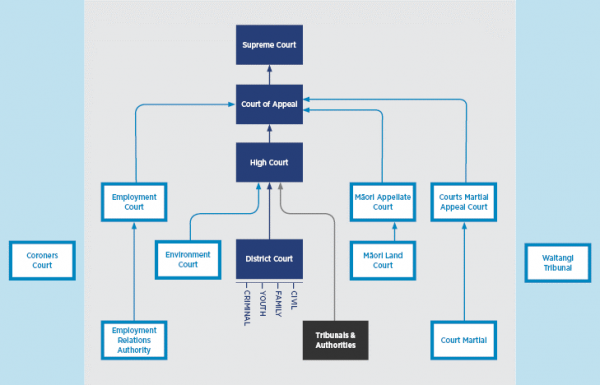2.0 Our court system
Courts resolve disputes between the state and individuals, or between individuals, through either the criminal justice system or the civil justice system.

New Zealand’s general courts are structured like a pyramid, with the Supreme Court at the top. Below, is the Court of Appeal, the High Court and the District Courts. These are ‘courts of general jurisdiction’. They are the main courts in our justice system.
If someone wants to appeal a decision made by a court, they appeal to a higher court to review the decision. For example, a case that is decided in a District Court can be appealed to the High Court, or sometimes directly to the Court of Appeal. The Supreme Court is the final appeal court but hears only a small proportion of cases.
A decision by a higher court is binding on lower courts. Decisions of the Supreme Court, as New Zealand’s highest court, are binding on all other courts.
District Court criminal appeals
Most District Court appeals go to the High Court, however, in appeals from jury trial outcomes, the appeals are made directly to the Court of Appeal. Appeals from decisions of Community Magistrates or Justices of the Peace are heard by a District Court Judge.
Tribunal and authorities
Appeals from Tribunals and Authorities can be found in the law that establishes them. The line of appeal for tribunals and authorities may either be to the District Court, the High Court, a specialist court or there may be no line of appeal.
The courts, tribunals and authorities listed receive administrative support from the Ministry of Justice except:
- The Employment Relations Authority, which is supported by the Ministry of Business, Innovation and Employment; and
- The Court Martial of New Zealand, which is supported by New Zealand Defence Force.
No line of appeal
- Abortion Supervisory Committee Criminal Justice Assistance Reimbursement Scheme
- Legal Complaints Review Officer
- Review Authority, Student Allowance Appeal Authority
- Victims’ Special Claims Tribunal
- Waitangi Tribunal
Appeals to District Court
- Birdlings Flat Land Titles Commissioner
- Disputes Tribunal
- Immigration Advisers Complaints & Disciplinary Tribunal
- Motor Vehicle Disputes Tribunal
- Secondhand Dealers & Pawnbrokers Licensing Authority
- Tenancy Tribunal
- Weathertight Homes Tribunal (for less than $200,000)
Appeals to High Court
- Accident Compensation Appeal Authority
- Accident Compensation District Court Registry
- Alcohol Licensing & Regulating Authority
- Copyright Authority
- Customs Appeal Authority
- Human Rights Review Tribunal
- Immigration & Protection Tribunal
- Land Valuation Tribunal
- Lawyers & Conveyancers Disciplinary Tribunal
- Legal Aid Tribunal (only on points of law)
- Private Security Personal Licensing Authority
- Real Estate Agents Disciplinary Tribunal
- Social Security Appeal Authority
- Taiapure-Local Fisheries Tribunal
- Taxation Review Authority
- Trans-Tasman Occupations Tribunal
- Weathertight Homes Tribunal (for more than $200,000).
Appeals to Employment Court
- Employment Relations Authority
This page was last updated: